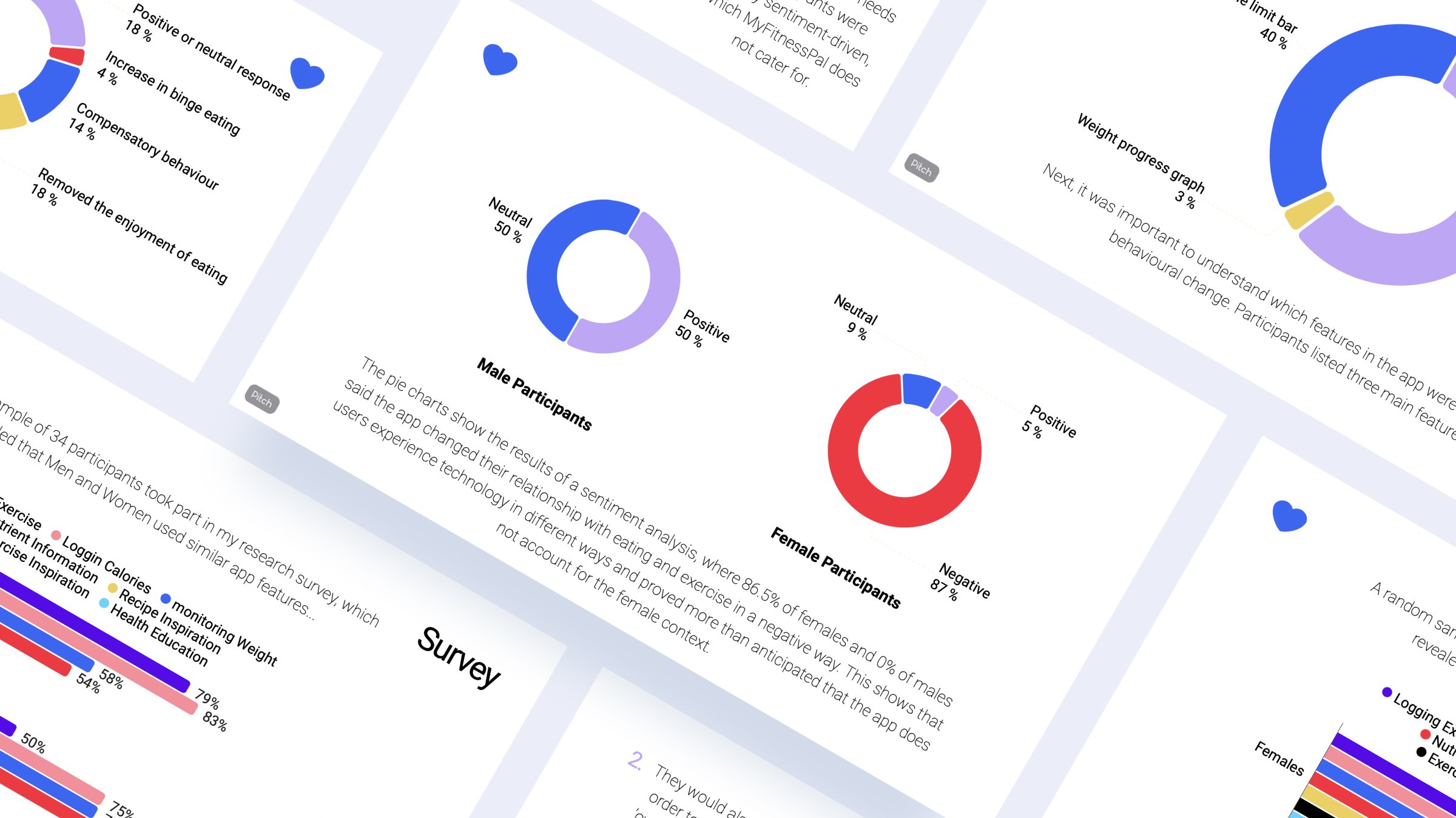
MyFitnessPal through a feminist lens:
This is a research project that offers a critique-based contribution to design.
-
Falmouth University of Arts
-
Researcher
UX designer
UI designer
-
Research paper
High fidelity prototype
This paper seeks to understand how UX influences women’s experiences of using the “ungendered” MyFitnessPal app. It also explores the consequences of women using a fitness app produced in a masculin design context. The research revealed that quantifying health through tracking calories with apps like MyFitnessPal has the potential to create or perpetuate disordered relationships with eating and exercise amongst female users.
methodology
This paper employs feminist HCI principles to advocate for the real lives, bodies and desires of female app users.
I address the questions posed in this study by understanding both people’s use of MFP (MyFitnessPal) and how it made them feel. A random sample of 34 male and female participants aged 18+ took part in a research survey. This was followed by a short think-aloud activity and a semi-structured interview with five female participants.
feminist HCI principles
Bardzell’s 2010 Feminist HCI (FHCI) principles guide the analysis. By applying these principles, the study aims to generate value-sensitive design alternatives for a "genderless" fitness app. Feminist Standpoint Theory (FST) reveals underlying power structures, such as industry norms and the 'thin ideal,' that shape women's app experiences, which are further discussed in the paper. These principles are:
Advocacy: Evaluates MFP's potential regressive practices, aiming to amplify marginalised voices.
Pluralism: Includes both male and female participants to identify gendered differences in app usage.
Ecology: Collects qualitative data on behavior and emotions to understand design’s impact.
Embodiment: Explores participants' definitions of health and their emotional responses to app features.
Participation: Gathers user suggestions for future fitness app improvements, setting the stage for participatory design.
discussion
Feminist HCI Methodologies (FHCIM) have identified harmful behavioral changes among female users of health apps like MyFitnessPal (MFP). This study uses FHCIM to critique these impacts and guide experience designers to avoid similar issues. Bardzell’s pluralism principle highlights that health tracking must be responsive to user context, as men and women use app features differently. Standpoint Theory (ST) indicates that MFP’s design, based on masculinist assumptions, is insensitive to female contexts, as it shows neutral or positive impacts on males but harmful effects on females. The study found that MFP’s quantitative metrics create damaging behaviors in women, who react negatively to numerical feedback. This supports the idea that MFP’s foundation is socially situated. Additionally, the focus on weight as a singular health determinant can lead to unhealthy eating habits. UX designers must consider the emotional impact of their designs, aligning with Bardzell’s embodiment principle, to create sensitive and positive user experiences.
conclusion
Feminist perspectives in design reveal the dangerous consequences of apps like MyFitnessPal (MFP), which claim to promote healthy behaviour but are influenced by masculine design assumptions that don't meet women's needs. Goal setting, self-tracking, and feedback centred on normative beauty ideals led to unhealthy outcomes for women. Feminist HCI methodologies indicate that MFP exacerbates disordered relationships with food and exercise in female participants, effects that weren’t seen in male participants. Using Bardzell’s FHCI principles, the study identified that lack of contextual awareness, reliance on quantifiable metrics, and focus on weight as the sole health indicator result in negative behaviours. Sentiment-driven tools, however, may positively impact female health. Therefore, a new participatory design approach involving female UX designers and participants is proposed.